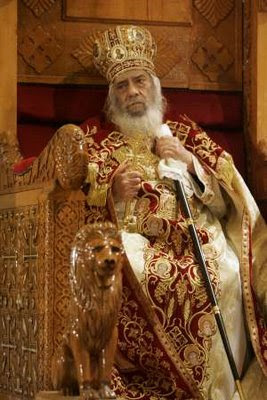+(1).jpg) I was wrong, and I have to admit that this occurs more often that I might like.
I was wrong, and I have to admit that this occurs more often that I might like.You see, I typically accuse other scholars of failing to appreciate the nuances in early Christianity and I think I have fallen victim to my own systemization efforts. Let me explain what I mean.
I have always wanted to prove that the Alexandrian 'Papacy' goes back much further than anyone wants to recognize (i.e. beyond Heraclas). Yet I have been pressing the issue with the word 'Papa' owing to our existing presuppositions about what a 'Pope' is.
Yet if the term means 'grandfather' (as I now think it must) this line of argument must be abandoned. Someone could only have been identified as a 'grandfather' in a tradition that had many 'fathers' and so - given the fact that there was only bishop in the Egyptian Church until Demetrius, it makes intuitive sense that the term 'Papa' was introduced around that time (or slightly thereafter).
Even with this said though if I want to follow the thread of the Alexandrian Patriarchy back to its source - and at the same time prove that the figure we now identify as 'the Pope' was a living representation of the 'power of the Father' a much better and easier argument can be developed with regards to a much more elusive term in Alexandrian Christianity - viz. that of 'Patriarch.'
Indeed the title is a compound term, originally employed by a man who exercised autocratic authority as a pater familias over an extended family. The system of such rule of families by senior males is called patriarchy. This is a Greek word, a composition of πατήρ (pater) meaning "father" and ἄρχων (archon) meaning "leader", "chief", "ruler", "king", etc.
Yet archon also was used in the sense of angelic 'Lord' among the Alexandrian Christians. Someone called a 'Patriarch' would necessarily have been recognized as a living representation of the 'power' of the 'Father' God, no?
Of course Abraham, Isaac, and Jacob are referred to as the three patriarchs of the people of Israel, and the period in which they lived is called the Patriarchal Age. There can be no doubt that this term originally acquired its religious meaning in the Septuagint version of the Bible, which of course was established in Alexandria.
We see the term 'Patriarch' applied to the leader of the Alexandrian Christian community at the time of Hadrian where the Emperor is said to have saint that:
Even the Patriarch himself, when he comes to Egypt, is forced by some to worship Serapis, by others to worship Christ.
Isn't it curious now that the term utterly disappears until a later period. Could it be that the Alexandrian's were dissuaded from identifying their bishop as 'Father-archon' and instead see him as a mere 'bishop' an overseer, even a shepherd? Again this requires additional research but it is - as always - an intriguing line of inquiry ...
If you are interested in reading how this observation fits within my greater understanding of the workings of Secret Mark WITHIN the contemporary Alexandrian Church please go here
If you want to read more about how Alexandrian Christianity was rooted in the Jewish traditions of Alexandria, Philo of Alexandria and more feel free to purchase my new book here
























































